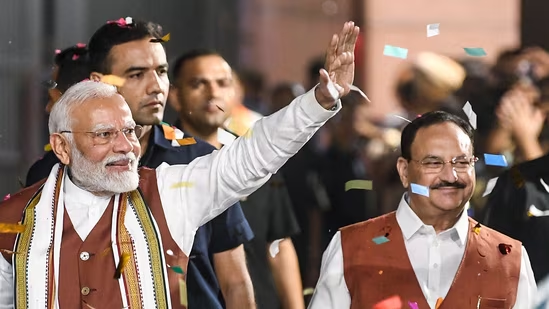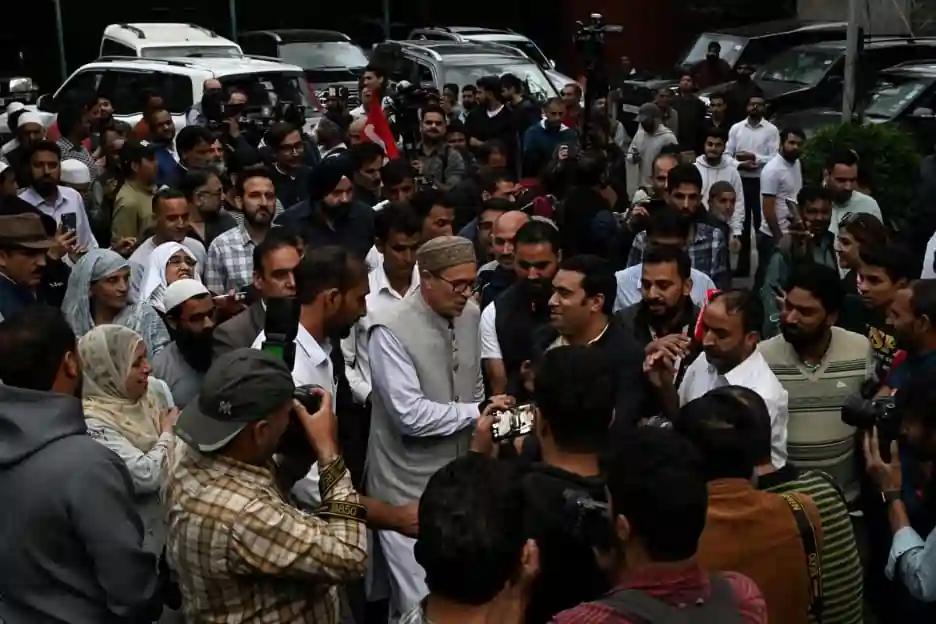In a surprising electoral turn, Prime Minister Narendra Modi's BJP secures a historic third term in Haryana and its best-ever performance in Jammu & Kashmir, marking a significant setback for the Congress party. This outcome highlights the BJP's enduring dominance in Indian politics, while Congress grapples with internal strife and questions regarding its future strategy.

New Delhi, October 10, 2024 – In a significant political shift, Prime Minister Narendra Modi’s Bharatiya Janata Party (BJP) has clinched a historic third term in Haryana, coupled with its best performance yet in Indian-administered Jammu & Kashmir. The assembly elections, held recently, underscore a dramatic reversal for the Congress party, which faced expectations of a resurgence after its recent parliamentary performance but instead suffered a crushing defeat.
Congress’s Election Woes Amidst Rising BJP Momentum
The results of the assembly elections, announced on Tuesday, reveal a substantial setback for the Congress party, which leads the Indian National Developmental Inclusive Alliance (INDIA). Following a tough battle in the parliamentary elections earlier this year, where Congress secured 234 seats and the BJP managed 240, many political analysts believed Congress was poised for a comeback in Haryana. However, the results told a different story: Congress not only failed to secure a victory but also lost to the BJP despite exit polls predicting a comfortable win for them.
Political analysts interpret these results as a reaffirmation of the BJP’s enduring influence in Indian politics since 2014. “The results provide a booster for Modi’s BJP, offering renewed confidence ahead of upcoming state elections in crucial territories,” stated Rasheed Kidwai, a noted political analyst. The BJP’s victory in Haryana comes in the wake of multiple electoral successes across the nation, which have solidified its position as the leading political force in India.
Internal Strife Contributes to Congress’s Loss
In Haryana, the Congress’s defeat can largely be attributed to internal discord within the party. The BJP’s vote share increased from 36.49% in the 2019 state elections to 39.89% this year. Conversely, Congress, while improving its share from 28.08% to 39.09%, primarily drew its support from regional parties, ultimately failing to dismantle the BJP’s core voter base.
A senior member of the Haryana Congress, speaking anonymously, lamented, “We lost due to our own differences and the reluctance of veteran leaders to accommodate fresh perspectives.” Internal struggles were evident in candidate nominations and campaign strategies, which critics argue were monopolized by influential party members, particularly former Chief Minister Bhupinder Singh Hooda. The party’s focus on individual ambitions rather than a collective strategy further exacerbated its decline.
Despite Congress’s gains in terms of vote percentage, the inability to unify and capitalize on anti-incumbency sentiments, especially among farmers and prominent figures like wrestlers protesting against the BJP, signifies deeper challenges ahead. “There was a palpable anti-BJP sentiment in many parts of Haryana, but we failed to convert that into votes,” acknowledged another Congress leader.
Refusing to Accept Defeat: Congress’s Controversial Stance
In an unprecedented move, the Congress party has publicly rejected the election results, alleging manipulation of electronic voting machines (EVMs). Party spokesman Jairam Ramesh stated, “The results contradict the ground reality. We will lodge complaints with the electoral body and pursue further action.” This rejection of election outcomes is unprecedented in Indian political history and raises questions about the party’s strategy and unity moving forward.
Congress’s refusal to accept the results reflects its ongoing struggle to come to terms with its diminishing influence in Indian politics. By alleging fraud, the party attempts to shift blame away from internal issues, but analysts caution that this approach could further alienate voters who desire accountability and transparency. Political strategist Prashant Kishor remarked, “Dismissing the election results as rigged without substantial evidence may lead to more harm than good for Congress.”
Bittersweet Gains in Jammu & Kashmir
Meanwhile, the situation in Jammu & Kashmir presents a bittersweet picture for the opposition. The regional National Conference (NC) emerged as the largest party, winning 42 of the 90 assembly seats, while the Congress, in alliance with the NC, managed to secure only six seats, marking its lowest tally since the revocation of Kashmir’s autonomy in 2019.
Analysts interpret this result as a mandate against the BJP’s efforts to alter the region’s political landscape. The NC’s success suggests a rejection of the BJP’s approach and a demand for the restoration of local governance. “The results reflect public discontent with the BJP’s governance and its handling of Kashmir’s autonomy,” said Sheikh Showkat, a political analyst. The NC’s ability to mobilize voters, particularly in the Kashmir Valley, highlights the importance of regional identity and local issues in shaping electoral outcomes.
Despite these challenges, the BJP maintains a stronghold in the Jammu region, winning 29 seats and garnering the highest vote share of 25.5%. However, the absence of representation from the Jammu region in the new government could further exacerbate tensions between the Hindu-majority Jammu and Muslim-majority Kashmir. The division within the electorate underscores the complexity of politics in the region, where local sentiments often outweigh national narratives.

Looking Ahead: What This Means for the Congress Party
The implications of these results are profound for the Congress party, particularly for its leader, Rahul Gandhi. Following a promising parliamentary election, Gandhi’s ambition to pivot towards a narrative of Congress’s individual success has been challenged by these outcomes. Analysts warn that the party must address its internal divisions and reassess its strategy to regain momentum against the BJP in the upcoming state elections in Delhi, Maharashtra, Bihar, and Jharkhand.
As political observers point out, the Congress has yet to demonstrate its ability to effectively confront the BJP’s dominance. With internal conflicts and a growing perception of ineffectiveness, the party faces a challenging road ahead in reclaiming its position within Indian politics. The losses in Haryana and Jammu & Kashmir serve as stark reminders of the work needed to unify and invigorate its base before the next electoral battle.
Moreover, the Congress party must consider a reevaluation of its core messages and outreach strategies. Building a more cohesive narrative around issues that resonate with the electorate, such as economic development, job creation, and social justice, will be essential. Engaging with grassroots movements and fostering a sense of accountability within party ranks can also facilitate a path forward.
In the face of the BJP’s consolidated power, Congress’s future hinges on its ability to adapt and innovate. To reinvigorate its image and rebuild trust among voters, the party must transform its internal dynamics and project a united front. The upcoming state elections will be critical, serving as a litmus test for the party’s resilience and strategic recalibration in an increasingly competitive political landscape.
Conclusion: A Defining Moment for Indian Politics
The recent election outcomes in Haryana and Jammu & Kashmir mark a defining moment in Indian politics, highlighting the ongoing struggle for power between the BJP and the Congress party. As the BJP continues to solidify its dominance, the Congress must confront its internal challenges head-on while reengaging with its voter base. The path ahead is fraught with obstacles, but it also presents opportunities for renewal and resurgence.
As political dynamics evolve, the lessons learned from these elections will be crucial in shaping the future of both parties and the broader landscape of Indian politics. The interplay of regional aspirations, national narratives, and internal party dynamics will ultimately dictate the course of political developments in the country, making the next electoral cycle one to watch closely.

